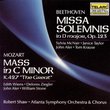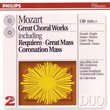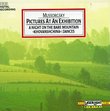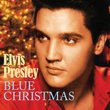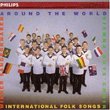| All Artists: Johann Sebastian Bach, Anthony Rolfe Johnson, Nancy Argenta, John Eliot Gardiner, Neill Archer, Cornelius Hauptmann, The Monteverdi Choir, Michael Chance, The English Baroque Soloists, Richard Earle, Lisa Beznosiuk, Pavlo Beznosiuk Title: Bach: St. John Passion / Gardiner, The English Baroque Soloists Members Wishing: 0 Total Copies: 0 Label: Archiv Produktion Release Date: 10/25/1990 Genre: Classical Styles: Opera & Classical Vocal, Historical Periods, Baroque (c.1600-1750), Sacred & Religious Number of Discs: 2 SwapaCD Credits: 2 UPC: 028941932426 |
Search - Johann Sebastian Bach, Anthony Rolfe Johnson, Nancy Argenta :: Bach: St. John Passion / Gardiner, The English Baroque Soloists
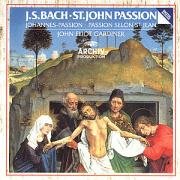 | Johann Sebastian Bach, Anthony Rolfe Johnson, Nancy Argenta Bach: St. John Passion / Gardiner, The English Baroque Soloists Genre: Classical
|
Larger Image |
CD DetailsSimilarly Requested CDs
|
CD ReviewsThe Passion of J.E. Gardiner Dr. Peter J. Glidden | Gli Angeli, California | 07/20/2000 (5 out of 5 stars) "I bought this recording (1986) in 1990 when I was an undergrad, living my junior year abroad in Paris. I couldn't really afford the purchase, and ended up going hungry for a few days at the end of that particular month. Well, I survived, I now own five separate recordings of this piece as well as the score, I've seen Peter Schreier conduct while singing the evangelist/tenor solos, and I still treasure this set. This is a strictly "in-house" Gardiner production with all characters and soloists gleaned from the staunch ranks ofhis regulars and the small parts from the Monteverdi choir itself. The orchestral soloists (original instruments, of course) have all gone one to great careers (notably Paul Goodman (viola d'amore) and Lisa and Paul Beznosiuk (flute and viola d'amore, respectively)). Listen to the opening chorus, "Herr, unser Herrscher." The inexorable rhythm brought out by the cellos, the force of the choir mounting like a tide - there is no adequate metaphor nor hyperbole. And before discussing the soloists (my usual "passion") let me first commend the choir further with their consumate musicianship, switching from frenzy-mob to pious Lutherns with nary a measure of rest! Extraordinary work. The soloists! There is no evangelist like Anthony Rolfe-Johnson (with a rarissime slip up in a recitative on the first disk. I won't say where, if you don't notice it so much the better) and Stephen Varcoe is simply the warmest voice Jesus ever had (I will say that Andreas Schmidt is more potent in Gardiner's recording of the Matthaus). Corneilius Hauptman moves his manly baritone around like nobody's business in his last aria "Eilt ihr angefochtnen Seelen" yet his ariosos are melting and lovely. Neil Archer is adequate in the unforgiving, jerky "Ach, mein Sinn" but makes up for it in his majestic arioso "Mein Herz" while Rufus Müller is transcendent in "Erwäge, wie sein blutgefäbter Rücken" (the imagery of this text, matched with this music, is sublime). Michael Chance, once again, gives us what we need for both his arias, "Von den Stricken..." and his "Es ist vollbracht" ("it is finished") sets the standard for the sensitivity, the desolation of this musical moment that no house-sized contralto can match. Ruth Holton acquits herself nicely of the (sort of trite) "Ich folge dich gleichfalls..." And then there is Nancy Argenta. Is it wrong to equate the "argent" of her same with such a perfect, silver, flute-toned soprano? How much lovelier is the sustained F of "Höch-sten" ("most high") without vibrato? Ms. Argenta tells us. For fourteen years and counting." The other great Bach Passion... ewomack | MN USA | 03/11/2004 (5 out of 5 stars) "Bach supposedly wrote 5 passions, two of which survive complete. Of one only the libretto survives, and supposedly pieces of one passion exist in one of Bach's Cantatas. The St. John's Passion is the earliest extant passion of Bach's (composed in the 1720s), and, seeing that the enormous and overwhelming St.Matthew Passion also still exists complete, it has lived in the shadow of its grand predecessor. Not to mention that Bach revised and rummaged through the St.John Passion throughout his life, so there can be no claim to a standard or definitive version (this is not the case with the St. Matthew Passion).This Passion is great in its own right. If the St.Matthew Passion did not exist, this work could almost take its place. Right from the opening bars it will be evident that great music is on its way, and it doesn't let up throughout the entire piece.Structurally, the work is almost identical to the St. Matthew Passion, in that it is made up of Recitatives, choruses, and arias. A character named "Evangelist" tells the details of the story in recatitive; arias typically express the feelings of individual characters; and the choruses provide emotional and spiritual reflection on the current scenes. The piece is meant for Christian consumption, and allows the listener to identify with Jesus' suffering and sacrifice through music. Music doesn't typically get more religious than this. However, the music is so amazing that it can be enjoyed even on a non-religious level.John Eliot Gardiner, The English Baroque Soloists, and the Monteverdi Choir are all in top form here. The performances are impeccable.The 76-page CD booklet contains a fascinating history of the passion form. It delineates the change in christianity away from a more Augustinian passion emphasizing redemption towards a more Fransiscan direct and immediate sympathy with Christ's suffering. This is the source of the Passion Play, and this tradition evolved into the form heard on Bach's incredible Passions (and the form is still going strong, controversially, at least according to recent box office sales).Listeners who find the St. Matthew Passion to be an "I felt the earth move" kind of experience will not be disappointed whatsoever with the St. John Passion. Though it's not as grand or as esteemed, it contains music of the same high quality. Now if we could just find those other three Passions..." The definitive St. John Passion E. A. Lovitt | Gladwin, MI USA | 03/30/2003 (5 out of 5 stars) "The choral group that I belong to alternates yearly Good Friday performances of J. S. Bach's St. John and St. Matthew Passions, and this year we're singing the former. Although Bach performed his work with male altos and sopranos, we employ female voices in the chorus, and the Monteverdi choir on this recording splits the difference and uses female sopranos and male altos.The English Baroque Soloists perform the orchestral accompaniment on period instruments, which allow them to balance their sound very beautifully against the chorus, even though there are more instrumentalists than singers. I believe the reason our music director uses his adult choir rather than his boys' choir on Good Friday is that his orchestra (pick-up musicians) with their modern instruments would tend to dominate the young voices.So it is a pleasure to hear the more authentic Bach on this Archiv Produktion CD, even though there is no substitute for the experience of actually singing this mighty work. John Eliot Gardiner is able to speed his smaller, more flexible choir through the turbo choruses at tempi that must elicit a wistful sigh from my music director. His handling of the chorales sustains the emotional build-up of the Passion setting, and reinforces the listener's understanding as to why hymns were (and are) such an important part of a Protestant service.The distinguished English tenor, Anthony Rolfe Johnson, sings the Evangelist in a clear, poignant tenor that is well-suited to this difficult role.All of this recording's soloists sing their arias with intelligence and grace, but for me the final chorus is the emotional culmination of this Passion: "Rest well, rest well, Beloved, sweetly sleeping. That I may cease from further weeping, and let me too, rest well.""
|

 Track Listings (20) - Disc #1
Track Listings (20) - Disc #1